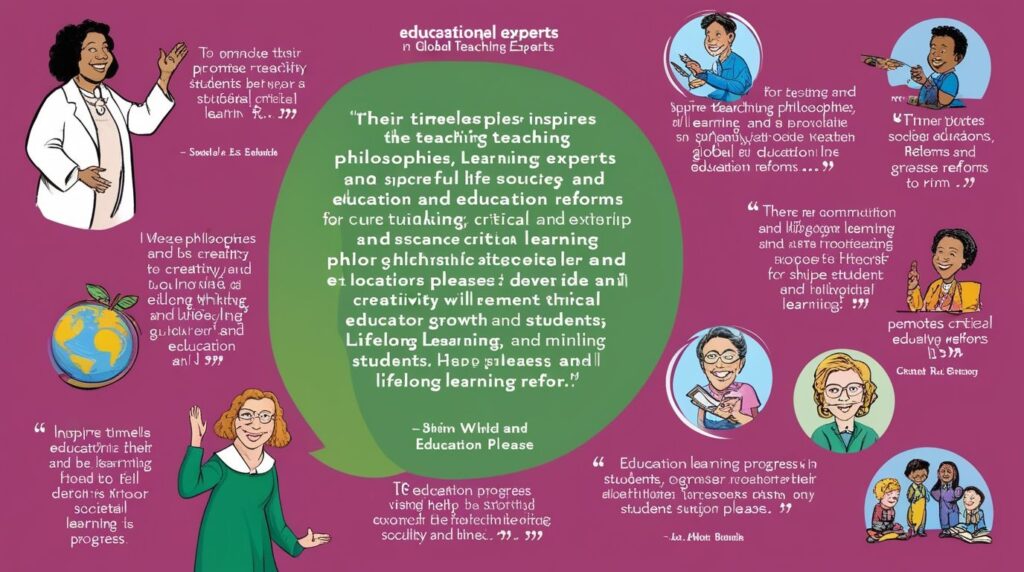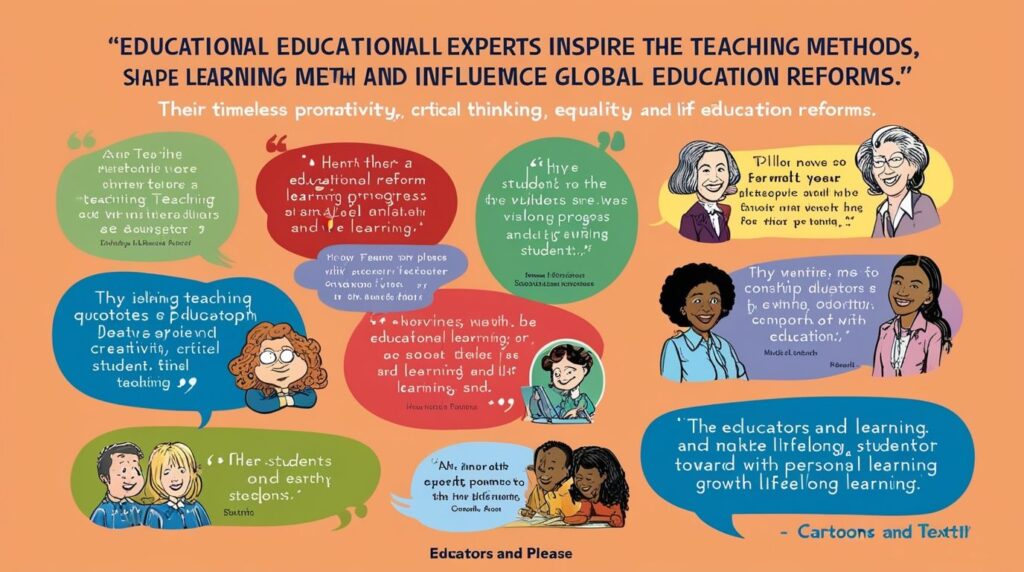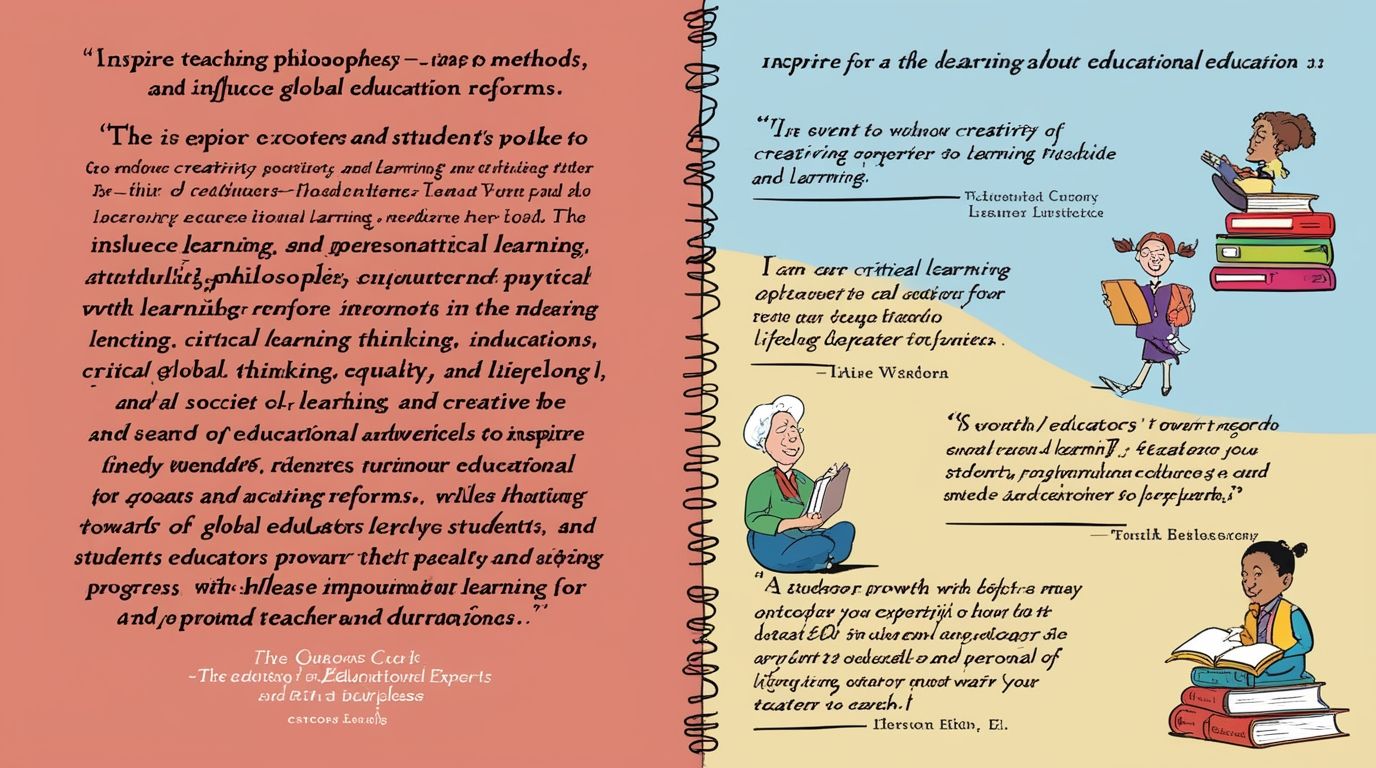Quotations by Educational Experts and Their Impact, Education is a cornerstone of societal progress, and its significance has been highlighted by numerous educational experts through profound quotations. These statements not only inspire educators and learners but also shape policies, methodologies, and teaching philosophies. This article explores famous quotations by educational experts, analyzing their meanings and impacts on education systems worldwide.
1. John Dewey (1859-1952)
Quotation: “Education is not preparation for life; education is life itself.”
Impact: John Dewey, a pioneer in progressive education, emphasized experiential learning and active participation. His quote underscores that learning is an ongoing, life-long process, not just a preparatory phase. This idea inspired modern educational systems to focus on practical experiences, project-based learning, and critical thinking rather than rote memorization.
2. Nelson Mandela (1918-2013)
Quotation: “Education is the most powerful weapon which you can use to change the world.”
Impact: Mandela’s statement reflects education as a transformative force for social justice and equality. It has influenced global education reforms, particularly in developing nations, highlighting the role of education in eradicating poverty, empowering marginalized communities, and fostering sustainable development.
3. Maria Montessori (1870-1952)
Quotation: “The greatest sign of success for a teacher is to be able to say, ‘The children are now working as if I did not exist.'”
Impact: Montessori advocated for child-centered education. Her quote promotes self-directed learning, independence, and intrinsic motivation. The Montessori method, rooted in this philosophy, has transformed early childhood education globally by encouraging curiosity, creativity, and exploration.
4. Paulo Freire (1921-1997)
Quotation: “Education does not change the world. Education changes people. People change the world.”
Impact: Freire’s words stress the importance of education as a tool for empowerment and social change. His emphasis on critical pedagogy influenced democratic teaching methods, encouraging students to question systems and advocate for justice.

5. Benjamin Franklin (1706-1790)
Quotation: “Tell me and I forget. Teach me and I remember. Involve me and I learn.”
Impact: Franklin’s statement laid the foundation for active learning methodologies. Modern practices such as group discussions, hands-on activities, and experiential learning techniques are influenced by this principle, enhancing retention and comprehension.
6. Malcolm X (1925-1965)
Quotation: “Education is the passport to the future, for tomorrow belongs to those who prepare for it today.”
Impact: This quote emphasizes the importance of education in achieving personal growth and securing future opportunities. It inspires lifelong learning and promotes early preparation to adapt to evolving global demands.
7. Aristotle (384-322 BC)
Quotation: “Educating the mind without educating the heart is no education at all.”
Impact: Aristotle’s philosophy underscores the balance between intellectual and moral development. Modern educational practices incorporate social-emotional learning (SEL) programs to develop empathy, ethics, and interpersonal skills alongside academic achievement.
8. Horace Mann (1796-1859)
Quotation: “Education, then, beyond all other devices of human origin, is the great equalizer of the conditions of men.”
Impact: Known as the ‘Father of American Public Education,’ Mann championed universal education as a means of promoting equality. His quote influenced policies advocating free and accessible education for all, reducing disparities.
9. Confucius (551-479 BC)
Quotation: “If your plan is for one year, plant rice. If your plan is for ten years, plant trees. If your plan is for one hundred years, educate children.”
Impact: Confucius highlighted the long-term impact of education. His emphasis on moral development and disciplined learning continues to shape educational values, particularly in Asian cultures.
10. Albert Einstein (1879-1955)
Quotation: “Education is not the learning of facts, but the training of the mind to think.”
Impact: Einstein’s quote underscores the importance of critical thinking and creativity over rote memorization. This perspective supports modern STEM education and problem-solving approaches, encouraging innovation and inquiry-based learning.
11. Jean Piaget (1896-1980)
Quotation: “The principal goal of education is to create men who are capable of doing new things, not simply of repeating what other generations have done.”
Impact: Piaget’s developmental theories transformed child psychology and education. His constructivist approach emphasized active learning, where students build knowledge through exploration and experimentation.

12. William Butler Yeats (1865-1939)
Quotation: “Education is not the filling of a pail, but the lighting of a fire.”
Impact: Yeats viewed education as a source of inspiration rather than mere information transfer. This idea supports motivational teaching strategies and lifelong curiosity, encouraging educators to ignite passion in their students.
13. Jerome Bruner (1915-2016)
Quotation: “Education must be not only a transmission of culture but also a provider of alternative views of the world and a strengthener of the will to explore them.”
Impact: Bruner’s constructivist theories influenced curriculum design, focusing on discovery learning and scaffolding. His quote advocates for exposing learners to diverse perspectives to broaden their horizons.
14. Carol Dweck (1946-Present)
Quotation: “Becoming is better than being.”
Impact: Dweck’s work on the growth mindset revolutionized education by promoting perseverance and adaptability. Her quote emphasizes continuous development and resilience, motivating students to embrace challenges.
15. Sir Ken Robinson (1950-2020)
Quotation: “Creativity is as important now in education as literacy, and we should treat it with the same status.”
Impact: Robinson’s advocacy for creativity reshaped education policies to include arts and creative subjects, inspiring schools to nurture individual talents and foster innovation.
Conclusion
Quotations by educational experts serve as guiding principles that inspire educators, policymakers, and students. They advocate holistic development, critical thinking, creativity, equality, and lifelong learning. By internalizing these insights, modern education systems can evolve to address the challenges of the 21st century while promoting equity and excellence.
References
- Dewey, J. (1916). Democracy and Education. New York: Macmillan.
- Freire, P. (1970). Pedagogy of the Oppressed. New York: Herder and Herder.
- Dweck, C. S. (2006). Mindset: The New Psychology of Success. New York: Random House.
- Robinson, K. (2006). Out of Our Minds: Learning to Be Creative. London: Capstone.
- Montessori, M. (1912). The Montessori Method. New York: Frederick A. Stokes Company.
- Franklin, B. (1750). The Autobiography of Benjamin Franklin. Philadelphia: J. P. Lippincott Company.

su kaçak tespit cihazı Erişimi Zor Alanlarda Çalışma: Evin bazı bölgelerine erişim zordu ama ekip bu konuda çok başarılıydı. http://banahkhabar.com/author/kacak/
This web site is really a walk-through for all of the info you wanted about this and didn’t know who to ask. Glimpse here, and you’ll definitely discover it.
Slot Gacor : Situs Slot Online Gacor yang Menjanjikan Kemenangan Besar
Togel Terpercaya : Daftar Togel Online yang Aman dan Terpercaya
dkbkus
I just couldn’t depart your web site prior to suggesting that I really enjoyed the standard information a person provide for your visitors? Is going to be back often to check up on new posts
Very interesting subject, appreciate it for putting up.
Normally I do not read article on blogs, but I would like to say that this write-up very forced me to try and do it! Your writing style has been amazed me. Thanks, quite nice post.
You made some nice points there. I looked on the internet for the subject and found most individuals will agree with your website.
Hi there! This is kind of off topic but I need some advice from an established blog. Is it hard to set up your own blog? I’m not very techincal but I can figure things out pretty fast. I’m thinking about creating my own but I’m not sure where to begin. Do you have any ideas or suggestions? Thanks
so much wonderful information on here, : D.
Utterly composed content material, regards for information .
I enjoy your writing style truly loving this web site.
hello there and thanks on your information – I’ve definitely picked up something new from proper here. I did on the other hand experience some technical points using this website, as I skilled to reload the web site many occasions prior to I may just get it to load correctly. I were puzzling over if your web host is OK? No longer that I’m complaining, however sluggish loading cases times will often affect your placement in google and can injury your quality score if advertising and ***********|advertising|advertising|advertising and *********** with Adwords. Well I am adding this RSS to my email and could glance out for a lot extra of your respective exciting content. Ensure that you replace this again soon..
Hello.This article was really interesting, particularly because I was investigating for thoughts on this subject last couple of days.